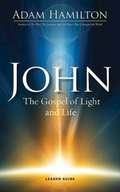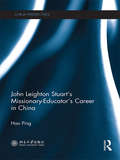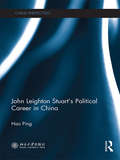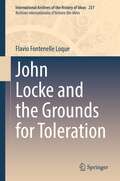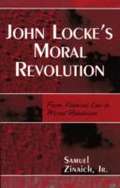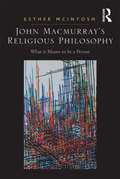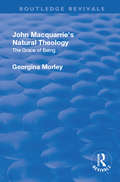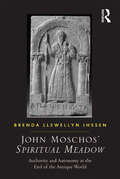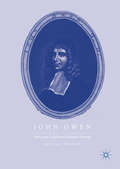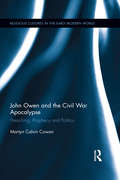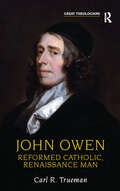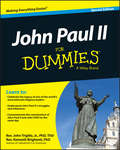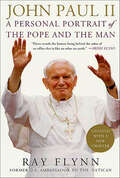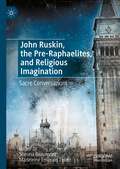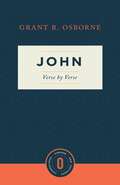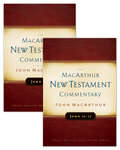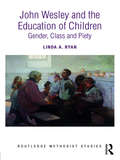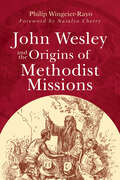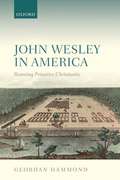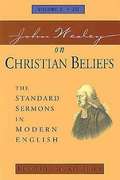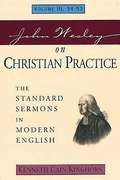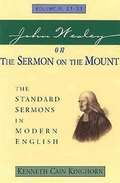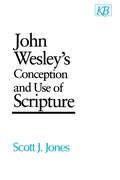- Table View
- List View
John Knox for Armchair Theologians
by Suzanne McdonaldThis volume in the popular Armchair series presents a short and reader-friendly introduction to the tumultuous life and theology of the fiery reformer John Knox. As leader of the Scottish Reformation, Knox notably came into conflict with the Roman Catholic Church, particularly Queen Mary. He was also an outspoken advocate for education and care for the poor, and is widely regarded as the founder of the Church of Scotland. Each chapter includes a description of Knox's activities as well as a discussion of key texts that introduce Knox's theological convictions. Expertly written by Suzanne McDonald, and featuring witty illustrations from Ron Hill, this book offers an intriguing introduction to the life and work of this major theological figure.
John Leader Guide: The Gospel of Light and Life (John series)
by Adam HamiltonThe Gospel of John is the most deeply spiritual of the four gospels. It includes some of the loftiest and most loved verses in all the Bible: "And the Word became flesh…," "For God so loved the world…," "You who are without sin cast the first stone…," "I am the resurrection and the life…," "I am the way, and the truth, and the life." The writing is filled with rich images and profound truths, but John notes that his aim in writing the gospel is that his readers will not only believe in Jesus Christ, but that they "may have life in his name."Join Adam Hamilton and experience a season of spiritual growth and life-changing renewal while exploring the major themes of John while reading the entire Gospel of John.The Leader Guide contains everything needed to guide a group through the bible study program including session plans and discussion questions, as well as multiple format options. This guide centers around the book, the videos, and Scripture.
John Leighton Stuart's Missionary-Educator's Career in China (China Perspectives)
by Hao PingIn China, John Leighton Stuart (1876-1962) is a controversial figure occupying an important position in the history of modern China and Sino-U.S. relations. As a scholar and educator, Stuart loved Chinese culture and contributed much to the development of Chinese education. While as a missionary, he was inherently prejudiced against Marxism. As the U.S. ambassador to China, Stuart executed U.S. government's policy, and was finally stereotyped as a symbol of "American imperialism". This book is a comprehensive and systematic study of Stuart's missionary-educator's career in China. It gives a detailed account of Stuart's missionary activities and contribution to the establishment and development of Yenching University as the founding president in China. Yenching, founded in 1919, left a significant and lasting legacy to Chinese education. It also contributed much to western studies on Asian culture with the Harvard-Yenching Institute established in 1928. By collecting substantial relevant materials both at home and abroad, both published and unpublished, this book reveals the multidimensional and complex features of Stuart, getting rid of the stereotype. Academic and general readers interested in Stuart, missionary education in modern China and modern Chinese history will be attracted by this book.
John Leighton Stuart’s Political Career in China (China Perspectives)
by Hao PingIn China, John Leighton Stuart (1876-1962) is a controversial figure occupying an important position in the history of modern China and Sino-U.S. relations. As a scholar and educator, Stuart loved Chinese culture and contributed much to the development of Chinese education. While as a missionary, he was inherently prejudiced against Marxism. As the U.S. ambassador to China, Stuart executed U.S. government's policy, and was finally stereotyped as a symbol of "American imperialism". This book gives a detailed account of Stuart's complicated and deep political involvement in modern China. Stuart had close relationships with Chiang Kai-shek and other high-ranking officials of Kuomingtang (KMT), while he was also an honored guest of Mao Tse-tung and Chinese Communist Party (CCP). During his tenure as the U.S. Ambassador to China, Stuart did implement U.S. government's policy of supporting KMT. But when the CCP's gaining power became inevitable, he took a pragmatic attitude and urged the U.S. government to normalize its diplomatic relations with the Communist Government. These seemingly contradictory behaviors reveal Stuart's complex features and the changeable era. By collecting substantial relevant materials both at home and abroad, both published and unpublished, this book reveals Stuart's multidimensional characters, getting rid of the stereotype. Academic and general readers interested in Stuart, modern Chinese history and Sino-U.S. relations will be attracted by this book.
John Locke and the Grounds for Toleration (International Archives of the History of Ideas Archives internationales d'histoire des idées #237)
by Flavio Fontenelle LoqueThis book offers a detailed analysis of John Locke’s case for toleration and proposes an interpretation that shows the links between his political reasoning and his reflection on the ethics of belief. Locke is concerned with toleration not only when he discusses the ends of the Commonwealth, but also when he assesses the duties of private persons regarding the search for truth. The purpose of this book is to shed light on both of these branches, which have not been sufficiently explored in other studies on Locke. With particular attention to the notions of charity, obstinacy, fallibility, reciprocity and distinction between belief and knowledge, the author proposes a reading of the Epistola de Tolerantia, an extensive discussion of the controversy between Locke and Jonas Proast, as well as an examination of An Essay Concerning Human Understanding, in order to establish the meaning and interconnection of Locke’s arguments in favour of toleration.
John Locke's Moral Revolution: From Natural Law to Moral Relativism
by Samuel Zinaich JrJohn Locke's Moral Revolution critiques two traditional approaches to John Locke's philosophy. The first approach interprets John Locke as committed to justifying his early his early Christian / Aristotelian views of the law of nature. The second approach sees Locke attempting to manage a cluster of inconsistent moral views. In this new work, author Samuel Zinaich, Jr. argues that Locke attempts to establish a solid underpinning for religious, moral, and political ideas upon the philosophy of corpuscularism.
John Macmurray's Religious Philosophy: What it Means to be a Person
by Esther McIntoshRecent dissatisfaction with individualism and the problems of religious pluralism make this an opportune time to reassess the way in which we define ourselves and conduct our relationships with others. The philosophical writings of John Macmurray are a useful resource for performing this examination, and recent interest in Macmurray's work has been growing steadily. A full-scale critical examination of Macmurray's religious philosophy has not been published and this work fills this gap, sharing his insistence that we define ourselves through action and through person-to-person relationships, while critiquing his account of the ensuing political and religious issues. The key themes in this work are the concept of the person and the ethics of personal relations.
John Macquarrie’s Natural Theology: The Grace of Being (Routledge Revivals Ser.)
by Georgina MorleyTitle first published in 2003. John Macquarrie has been a major contributor in the theological world for more than forty years, but as yet very little secondary material on his work has appeared. This book offers an insightful introduction to Macquarrie's theology, arguing that at its heart is a systematic theology of gift. Tracing the development of his thought from its early existentialism to the social and world-affirming perspectives of later writings, this book shows how these developments emerge in dialogue with contemporary thinkers. Morley demonstrates how Macquarrie's theology mediates between two traditionally opposing theologies of gift and being, centring on the doctrines of God and of human being, and reaching its fullest expression in Christology, with Christ as the focal point of two personal movements of self-giving - divine and human. Macquarrie himself contributes a Foreword.
John Moschos' Spiritual Meadow: Authority and Autonomy at the End of the Antique World
by Brenda Llewellyn IhssenJohn Moschos' Spiritual Meadow is one of the most important sources for late sixth-early seventh century Palestinian, Syrian and Egyptian monasticism. This undisputedly invaluable collection of beneficial tales provides contemporary society with a fuller picture of an imperfect social history of this period: it is a rich source for understanding not only the piety of the monk but also the poor farmer. Brenda Llewellyn Ihssen fills a lacuna in classical monastic secondary literature by highlighting Moschos' unique contribution to the way in which a fertile Christian theology informed the ethics of not only those serving at the altar but also those being served. Introducing appropriate historical and theological background to the tales, Llewellyn Ihssen demonstrates how Moschos' tales addresses issues of the autonomy of individual ascetics and lay persons in relationship with authority figures. Economic practices, health care, death and burials of lay persons and ascetics are examined for the theology and history that they obscure and reveal. Whilst teaching us about the complicated relationships between personal agency and divine intercession, Moschos’ tales can also be seen to reveal liminal boundaries we know existed between the secular and the religious.
John Owen
by Ryan M. Mcgraw"The Foundation of Communion with God" introduces readers to the Trinitarian piety of John Owen (1616-1683).
John Owen and the Civil War Apocalypse: Preaching, Prophecy and Politics (Religious Cultures in the Early Modern World)
by Martyn Calvin CowanJohn Owen was one of the most significant figures in Reformed Orthodox theology during the Seventeenth Century, exerting considerable religious and political influence in the context of the British Civil War and Interregnum. Using Owen’s sermons from this period as a window into the mind of a self-proclaimed prophet, this book studies how his apocalyptic interpretation of contemporary events led to him making public calls for radical political and cultural change. Owen believed he was ministering at a unique moment in history, and so the historical context in which he writes must be equally considered alongside the theological lineage that he draws upon. Combining these elements, this book allows for a more nuanced interpretation of Owen’s ministry that encompasses his lofty spiritual thought as well as his passionate concerns with more corporeal events. This book represents part of a new historical turn in Owen Studies and will be of significant interest to scholars of theological history as well as Early Modern historians.
John Owen: Reformed Catholic, Renaissance Man (Great Theologians Series)
by Carl R. TruemanJohn Owen is considered one of the sharpest theological minds of the seventeenth century and a significant theologian in his own right, particularly in terms of his contributions to pneumatology, christology, and ecclesiology. Carl Trueman presents a major study of the key elements of John Owen's writings and his theology. Presenting his theology in its historical context, Trueman explores the significance of Owen's work in ongoing debates on seventeenth century theology, and examines the contexts within which Owen's theology was formulated and the shape of his mind in relation to the intellectual culture of his day - particularly in contemporary philosophy, literature and theology. Examining Owen's theology from pneumatological, political and eschatological perspectives, Trueman highlights the trinitarian structure of his theology and how his theological work informed his understanding of practical Christianity. With the current resurgence of interest in seventeenth century Reformed theology amongst intellectual historians, and the burgeoning research in systematic theology, this book presents an invaluable study of a leading mind in the Reformation and the historical underpinnings for new systematic theology.
John Paul II For Dummies, Special Edition
by Rev John Trigilio Jr. Rev Kenneth Brighenti Rev Monsignor James Cafone Rev Jonathan ToborowskyFind out how two extraordinary leaders changed religion and the worldIn April 2014, Pope Francis will jointly canonize two predecessors, John Paul II and John XXIII, in a move that recognizes the extraordinary accomplishments of these leaders of the Catholic faith. An estimated 1 million people filled St. Peter's Square and the surrounding streets for John Paul II's beatification, and the joint canonization will attract even more. With John Paul II For Dummies, Special Edition you can learn more about these admired religious leaders and join millions of devotees in celebrating their lives and legacies. You'll get an in-depth look at John Paul II's remarkable life and achievements and learn more about the beloved John XXIII in a bonus chapter. With this special edition e-book written in friendly, plain English, you'll discover how John Paul II's deep religious convictions affected world politics, history, and the Catholic faith. You'll be introduced to his influences, his personal struggles, the way he impacted the Church, and his methods for spreading his powerful message. Catholics and non-Catholics alike will find the stories of these holy men fascinating and inspiring. Introduces you to the lives and legacies of both John Paul II and John XXIIIPresents you with the struggles, influences, and approaches to world politics of John Paul II, whose actions had a great impact on historyIncludes a bonus chapter that details the life of John XXIII, who will be canonized along with John Paul II in April 2014Written in an engaging, accessible style and a great read for Catholics and non-Catholics alikeJohn Paul II For Dummies, Special Edition is your guide to discovering the exemplary lives of two rare and extraordinary men who have influenced generations of people all over the world.
John Paul II: A Personal Portrait of the Pope and the Man
by Ray FlynnUnlike any other pope, John Paul II has reached out, creating dialogue or creating uproar, but always striving to unite the human community. Drawing on years of personal interaction with the Pope, and on his unique understanding of the intersection of religion and politics, Flynn, with co-authors Robin Moore and Jim Vrabel, shows how John Paul II changed the papacy, perhaps forever.
John Ruskin, the Pre-Raphaelites, and Religious Imagination: Sacre Conversazioni
by Sheona Beaumont Madeleine Emerald ThieleThis volume presents a collection of essays by leading experts which examine nineteenth century ideas about Christian theology, art, architecture, restoration, and curatorial practice. The volume unveils the importance of John Ruskin’s writing for today’s audience, and allies it with the dynamism of the Pre-Raphaelite religious imagination. Ruskin’s drawings and daguerreotypes, as well as Pre-Raphaelite paintings, stained glass, and engravings, are shown to be alive with visual theology: artists such as Dante Gabriel Rossetti, John Everett Millais, Edward Burne-Jones, and Evelyn de Morgan illuminate aspects of faith and aesthetics. The interdisciplinary nature of this volume encourages reflection upon praise, truth, and beauty. The aesthetic conversations between Ruskin and the Pre-Raphaelites themselves become a form of ‘sacra conversazione’.
John Verse by Verse (Osborne New Testament Commentaries)
by Grant R. OsborneJohn is at once the most complex and the easiest to understand of all the Gospels. If we want a young seeker or new believer to read something that is both clear and filled with the gospel and good basic theology, we give them the Gospel of John. And if we want to study an incredibly deep theological masterpiece that stretches the brightest mind, we open the Gospel of John. It is the most evangelistic account of Jesus' life and ministry, and it also gives the mature Christian deep theological truths to chew on. In John Verse by Verse, respected New Testament scholar Grant R. Osborne invites the reader to become caught up in the dramatic masterpiece of the Fourth Gospel. He writes, "If I were teaching a course in college or seminary on creative writing, John's Gospel would be set alongside Shakespeare as models of brilliant characterization and plot." It is perhaps Osborne's favorite book of the Bible, and enthusiasm for it shines on every page. The Osborne New Testament Commentaries, by respected professor and author Grant R. Osborne, are for people seeking a straightforward explanation of the text in its context, avoiding either oversimplification or technical complexity. Osborne brings out the riches of the New Testament, making each book accessible for pastors and all who consider themselves students of Scripture.
John Volumes 1 & 2 MacArthur New Testament Commentary Set (MacArthur New Testament Commentary Series)
by John MacArthurThis package includes the complete two-volume set of the Gospel of John from the MacArthur New Testament Commentary series: John 1-11 and John 12-21. The MacArthur New Testament Commentary series continues to be one of today's top-selling commentary series. In the volume one and two of the Gospel of John, MacArthur gives verse-by-verse analysis in context and provides points of application for passages, illuminating the biblical text in practical and relevant ways. The series has been praised for its accessibility to lay leaders, and is a must-have for every pastor's library.
John Volumes 1 & 2 MacArthur New Testament Commentary Set (MacArthur New Testament Commentary Series)
by John MacArthurThis package includes the complete two-volume set of the Gospel of John from the MacArthur New Testament Commentary series: John 1-11 and John 12-21. The MacArthur New Testament Commentary series continues to be one of today's top-selling commentary series. In the volume one and two of the Gospel of John, MacArthur gives verse-by-verse analysis in context and provides points of application for passages, illuminating the biblical text in practical and relevant ways. The series has been praised for its accessibility to lay leaders, and is a must-have for every pastor's library.
John Wesley and the Education of Children: Gender, Class and Piety (Routledge Methodist Studies Series)
by Linda A. RyanScholars have historically associated John Wesley’s educational endeavours with the boarding school he established at Kingswood, near Bristol, in 1746. However, his educational endeavours extended well beyond that single institution, even to non-Methodist educational programmes. This book sets out Wesley’s thinking and practice concerning child-rearing and education, particularly in relation to gender and class, in its broader eighteenth-century social and cultural context. Drawing on writings from Churchmen, Dissenters, economists, philosophers and reformers as well as educationalists, this study demonstrates that the political, religious and ideological backdrop to Wesley’s work was neither static nor consistent. It also highlights Wesley’s eighteenth-century fellow Evangelicals including Lady Huntingdon, John Fletcher, Hannah More and Robert Raikes to demonstrate whether Wesley’s thinking and practice around schooling was in any way unique. This study sheds light on how Wesley’s attitudes to education were influencing and influenced by the society in which he lived and worked. As such, it will be of great interest to academics with an interest in Methodism, education and eighteenth-century attitudes towards gender and class.
John Wesley and the Origins of Methodist Missions
by Philip Wingeier-RayoLearn how Methodism became a worldwide mission.It is broadly understood that John Wesley was the founder of the Methodist movement that spread around the world in the eighteenth century. He is known for being a missionary in Georgia, his “heart-warming” experience at Aldersgate, field preaching, and the famous quote “the world is my parish.” It is also assumed that Wesley was a proponent of world missions and helped spread the Methodist movement around the world. This study examines this assumption and, after a closer look, reveals John Wesley’s reluctance to send missionaries overseas. The book uncovers several examples of Wesley’s rejection of world missions and occasions when he thwarted plans. Wesley undermined the efforts of Thomas Coke, the Father of Methodist Missions, who wrote an appeal to send missionaries abroad. John Wesley and the Origins of Methodist Missions reveals that it was unheralded lay people, ordinary immigrants, merchants, planters, soldiers, enslaved persons, and former slaves, who carried Methodism with them to such far-off places at Antigua, Maryland, New York, Gibraltar, Nova Scotia, and Sierra Leone. Persons such as Nathaniel Gilbert, Sophia Campbell, Mary Alley, and Bessie started a multiracial Methodist Society in Antigua—the first outside of Europe. These lay people, and several others, were not officially commissioned or authorized by Wesley to plant Methodist societies. Rather they traveled on their own, motivated by the love of God and neighbor, to share their faith with others. It was only after these Methodist societies were established, and after multiple appeals, that John Wesley and the British Conference conceded to send missionaries to assist. John Wesley was not anti-mission. He was very missional in his context in England and his message of God’s grace was at the heart of the Methodist movement. Yet he was cautious and reluctant to send missionaries overseas. This book offers some reasons for his hesitancy and highlights the stories, challenges, and successes of these pioneer men and women who spread Methodism around the world.Foreword by Natalya Cherry.
John Wesley in America: Restoring Primitive Christianity
by Geordan HammondWhy did John Wesley leave the halls of academia at Oxford to become a Church of England missionary in the newly established colony of Georgia? Was his ministry in America a success or failure? These questions--which have engaged numerous biographers of Wesley--have often been approached from the vantage point of later developments in Methodism. Geordan Hammond presents the first book-length study of Wesley's experience in America, providing an innovative contribution to debates about the significance of a formative period of Wesley's life. John Wesley in America addresses Wesley's Georgia mission in fresh perspective by interpreting it in its immediate context. In order to re-evaluate this period of Wesley's life, Hammond carefully considers Wesley's writings and those of his contemporaries. A laboratory for implementing his views of primitive Christianity, the mission served to restore the doctrine, discipline, and practice of the early church in the pristine Georgia wilderness. Understanding the centrality of primitive Christianity to Wesley's thinking and pastoral methods is essential to comprehending his experience in America. Wesley's conception of primitive Christianity was rooted in his embrace of patristic scholarship at Oxford. The most direct influence, however, was the High Church ecclesiology of the Usager Nonjurors who inspired him with their commitment to the restoration of the primitive church.
John Wesley on Christian Beliefs: The Standard Sermons In Modern English Volume 1
by John Wesley Kenneth Cain KinghornHow many times have you heard people say "everyone should read Wesley" or maybe you've thought about reading the Standard Sermons but couldn't get past the original language? This volume contains the first twenty sermons, in which Wesley deals with theology, in modern English, making this volume appropriate for individual and small group study. Lay speakers, local pastors, and small group members will enjoy this book.
John Wesley on Christian Practice: The Standard Sermons in Modern English Volume 3
by John Wesley Kenneth Cain KinghornThis is the third volume of the Standard Sermons of John Wesley, transcribed into today's English. These volumes accurately transcribe their eighteenth-century language into a form suitable for today's reader. This volume contains the last twenty sermons, in which Wesley deals with questions and concerns facing the Methodist movement in its early days: the balance of faith and works; the charge that the Methodists were enthusiasts; tolerance (catholic spirit) among believers; Christian perfection; new birth; and others.
John Wesley on The Sermon on the Mount: The Standard Sermons in Modern English Volume 2
by John Wesley Kenneth Cain KinghornHave you ever tried to read the original sermons? This volume contains the sermons Wesley preached on the Sermon on the Mount in language for today's readers.
John Wesley's Conception and Use of Scripture (Kingswood Series)
by Scott J. JonesDespite wide acceptance of the "Wesleyan quadrilateral", significant disagreements have arisen in both academic and church circles about the degree to which Scripture stood in a place of theological primacy for Wesley, or should do so for modern Methodists, and about the proper and appropriate methods of interpreting Scripture. In this important work, Scott J. Jones offers a full-scale investigation of John Wesley's conception and use of Scripture. The results of this careful and thorough investigation are sometimes surprising. Jones argues that for Wesley, religious authority is constituted not by a "quadrilateral", but by a fivefold but unitary locus comprising Scripture, reason, Christian antiquity, the Church of England, and experience. He shows that in actual practice Wesley's reliance on the entire Christian tradition - in particular of the early church and of the Church of England - is far heavier than his stated conception of Scripture would seem to allow, and that Wesley stresses the interdependence of the five dimensions of religious authority for Christian faith and practice.

